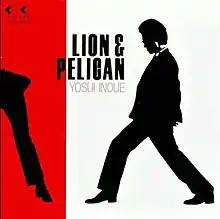Lion & Pelican
Lion & Pelican is the tenth studio album recorded and produced by a Japanese singer-songwriter Yōsui Inoue, released in December 1982.
| Lion & Pelican | ||||
|---|---|---|---|---|
 | ||||
| Studio album by | ||||
| Released | December 5, 1982 | |||
| Recorded | KRS Studio, Sound Inn Studio, Take One Studio, Banana Studio | |||
| Genre | Adult contemporary | |||
| Label | For Life | |||
| Producer | Yōsui Inoue | |||
| Yōsui Inoue chronology | ||||
| ||||
| Singles from Lion & Pelican | ||||
| ||||
The album has been well known for a song "Riverside Hotel", which was originally released as a single before the album came out. It became a smash hit in later years, because the song was featured as a theme song for the drama Love Story in New York aired on Fuji TV in 1988.
Lion & Pelican also includes Inoue's own rendition of "Senaka Made 45-fun" and "Chinese Food", the songs that he previously wrote for Kenji Sawada's album Mis Cast released in 1982.[1] The album itself gained moderate commercial success, selling in excess of 150,000 copies although it couldn't reach the top-ten on the charts.
Track listing
All lyrics written and composed by Yosui Inoue
- "Tomadou Pelican (とまどうペリカン)"
- "Chinese Food"
- "Yakusoku wa Reiji (約束は0時)"
- "Aisaretebakari Iru to (愛されてばかりいると)"
- "Canary (カナリア, Kanaria)"
- "Love Shock Night (ラブ ショック ナイト, Rabu Shokku Naito)"
- "Riverside Hotel (リバーサイド ホテル, Ribāsaido Hoteru)"
- "Onegai wa Hitotsu (お願いはひとつ)"
- "Wakannai (ワカンナイ)"
- "Senaka Made 45-fun (背中まで45分)"
Personnel
The following personnel was credited in the liner notes for box-set No Selection, released in 1991.
- Yōsui Inoue - Lead vocals, chorus, guitar
- Tōru Aoyama - Guitar
- Kazuo Shiina - Guitar
- Fujimal Yoshino - Guitar
- Hiromi Yasuda - Guitar
- Kenji Ōmura - Guitar
- RA - Guitar
- Ryōmei Shirai - Guitar
- Makoto Matsushita - Guitar
- Akira Wada - Guitar
- Tsugutoshi Gotō - Bass
- Akira Okazawa - Bass
- Michio Nagaoka - Bass
- Shigeru Okazawa - Bass
- Kiyofumi Onoda - Bass
- Yasuharu Nakanishi - Keyboards
- Ryoichi Kuniyoshi - Keyboards
- Tōru Okada - Keyboards
- Yūji Kawashima - Synthesizer
- Izumi Kobayashi - Synthesizer
- Osamu Nakajima - Percussion
- Motoya Hamaguchi - Percussion
- Hideo Yamaki - Drums
- Jun Aoyama - Drums
- Eiji Shimamura - Drums
- Kiyoshi Tanaka - Drums
Production
- Producer, performer, composer, lyricist: Yōsui Inoue
- Arranger: Yūji Kawashima(M2/4/5/10), Katz Hoshi (M1/7), Tsugutoshi Gotō (M3/9), Ginji Itou (M6), Yasuharu Nakanishi (M8)
- Director: Shohei Kaneko
- Recording and Remix Engineer:Toshiyuki Iizumi, Tomiji Iyobe, Yūji Kawashima
- Coordinator: Masahiko Ikeda
- Art Director: Isao Sakai
- Photographer: Katsuo Hanzawa
- Stylist: Hideo Mori
- Hair/Make: Kikumaru
- Design: Takeharu Tanaka,Yumiko Ohta (Soap inc.)
- Artist Management: Camp Co.,Ltd.
Chart positions
Album
| Year | Album | Country | Chart | Position | Weeks | Sales |
|---|---|---|---|---|---|---|
| 1982-83 | Lion and Pelican | Japan | Oricon Weekly LP Albums Chart (top 100)[2] | 13 | 24 | 158,000+ |
| Oricon Weekly CT Albums Chart (top 100) | 22 | 24 | ||||
Singles
| Single | B-Side | Chart | Position | Weeks | Sales |
|---|---|---|---|---|---|
| ”Riverside Hotel" | "Ore no Jimusho wa Camp" | Japanese Oricon Weekly (top 100) | 11 | 44 | 214,000 |
| "Tomadou Pelican" | "Music High" | 69 | 7 | 20,000 | |
| "Aisaretebakari Iru to" [Single version] | "Senaka Made Yonjū-go Fun" | 35 | 9 | 41,000 |
Release history
| Country | Date | Label | Format | Catalog number | Notes |
|---|---|---|---|---|---|
| Japan | December 5, 1982 | For Life Records | LP | 28K45 | |
| Audio cassette | 28C29 | ||||
| April 21, 1985 | CD | 35KD8 | |||
| February 21, 1990 | FLCF-29033 | ||||
| May 30, 2001 | FLCF-3853 | Original recording digitally remastered | |||
| March 25, 2009 | For Life Music Entertainment/BMG | SHM-CD | FLCF-5006 | 2001 Digital remaster |
References
- "track listing of the album Mis Cast (2005 Original Recording Digitally Remastered Edition) by Kenji Sawada". goo.ne.jp (in Japanese). Archived from 沢田研二 MIS CAST - goo 音楽 the original Check
|url=value (help) on 2011-07-23. Retrieved 2009-05-13. - "Yamachan Land (Archives of the Japanese record charts) - Albums Chart Daijiten - Yosui Inoue" (in Japanese). Archived from the original on 2007-06-19. Retrieved 2009-04-24.